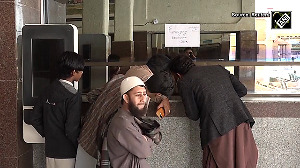The three banks - DBS Holdings, Overseas Chinese Banking Corporation and United Overseas Bank - will be given national treatment at par with Indian banks with regard to branches, places of operation and prudential requirements, Commerce Minister Kamal Nath said.
In turn, Indian banks already operating in Singapore will qualify for national treatment there, which means they will be allowed electronic fund transfer and clearance besides use of local ATMs, he said.
Giving details of the CECA, which will be formally signed during the visit of Singapore Prime Minister on June 29, Nath said the two countries will totally eliminate customs duties on 506 items from August 1 this year as part of the early harvest programme.
To boost foreign investments, the CECA has weaved in a double taxation avoidance agreement on the lines of the one with Mauritius with additional safeguards like sharing of information to prevent its misuse.
The 739-page agreement also provides for easing of visa restrictions for Indian professionals. There will be mutual recognition of 129 education degrees given by UGC-recognised universities for visa purposes.
Nath allayed fears of Chinese goods flooding Indian markets saying CECA will have very stringent rules of origin, comprising simultaneous application of change in tariff heading and value addition of 40 per cent.
Some well-defined insufficient operations have been prescribed under CECA to ensure that only the goods, which are actually manufactured in Singapore and India benefit under the pact.
In services, Indian and Singapore have taken commitments beyond their offer at the WTO. In particular, in financial services, a deeper integration with the Singapore financial services is expected to take place.
Market regulator SEBI had put a cap of 10 per cent on investment by foreign institutional investors in a company, which is to be raised to 20 per cent for Temasek and Singapore government investment company, Nath said.
He said Asset Management Companies would also be allowed to be set up in India for managing operations outside India, Nath said.
This is India's first CECA with any country and also for the first time New Delhi is entering the bilateral economic integration agreement in services.
The agreement is an integrated package comprising trade in goods and services, an agreement on investments and mutual recognition agreements in services and conformity assessment of standards in goods.
It would also have cooperation pacts in customs, science and technology, education, media, e-commerce and intellectual property.
Apart from eliminating customs duty on 506 items comprising 80 per cent of goods presently traded between the two countries, there would be phased elimination of duties on 2,202 items and phased reduction on 2,407 items by 2009.
There would also be negative list of 6,551 items where no concessions have been offered. Trade in goods will include exchange of tariff concessions under the eight-digit ITC harmonised system code covering 11,666 items.
Singapore has also agreed to allow Indian beer to be exported but the ban on tobacco continues.
The bilateral trade now stands at $6.4 billion with India having a trade surplus of $1.2 billion. Trade is expected to go up substantially with the signing of CECA
and, Nath said, adding FII flow is likely to go up 300 per cent to $5 billion while FDI flow is expected to be around $2 billion in the first year of the agreement.
The agreement also provides for cooperation between stock exchanges and companies listed on National Stock Exchange and Bombay Stock Exchange could be traded in Singapore bourses as well.
The CECA would also provide for a bilateral investment protection agreement, Nath said, adding this far-reaching pact will provide very important investment platform as Singapore is considered a major trading and investment hub in the world.
On movement of professionals, mutual recognition agreements will be entered into within a year in architecture, accountancy, legal, medical and dental nursing, he said.
The agreement provides for mutual recognition of standards, the minister said. Singapore has offered zero duty entry for all products made in India.
The liberalisation of the services sector would improve efficiency in economy, while mutual recognition of education degrees would provide new avenues to Indian professionals.
Investments from Singapore, which increased 114 per cent during 2004-05, would also go up substantially, he added.






 © 2025
© 2025